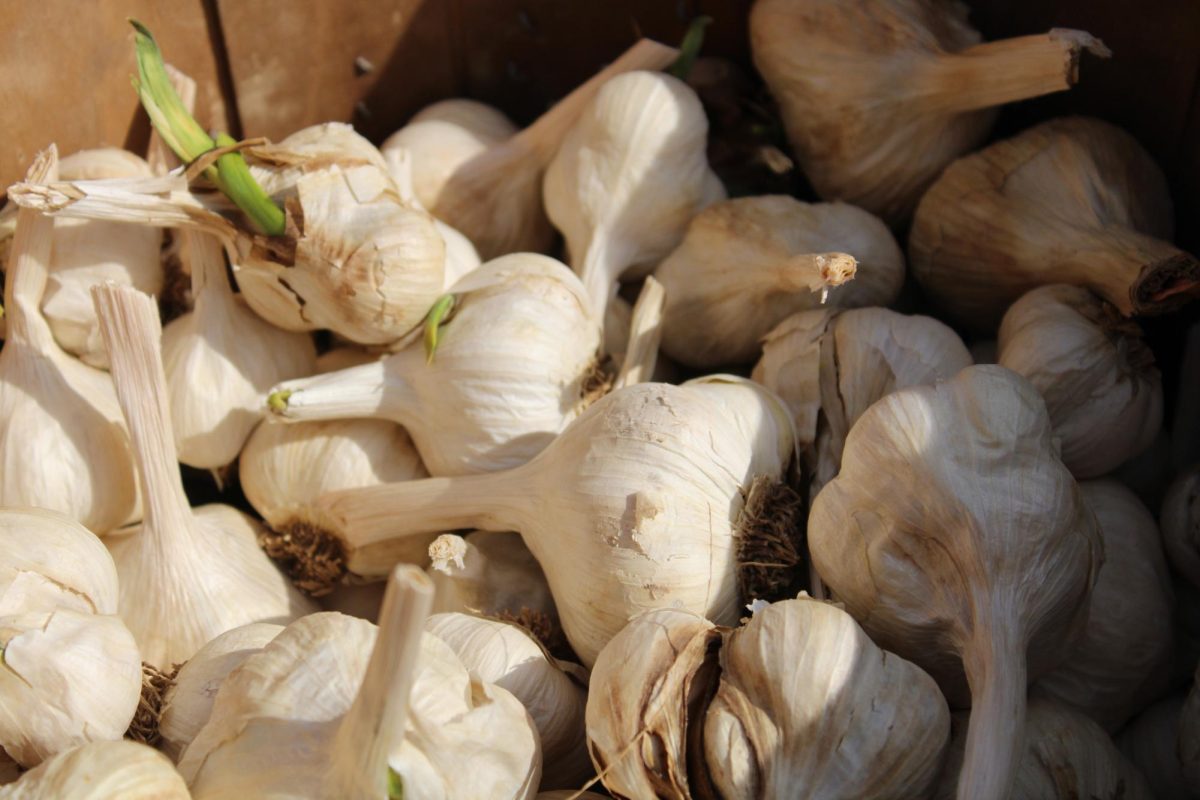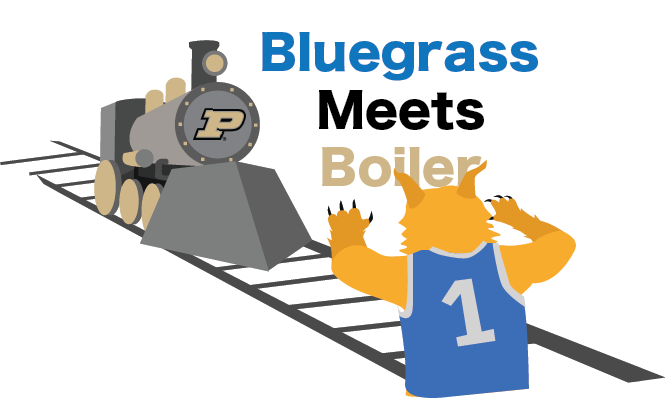A cold winter breeze brushed my shoulders; the smell of fresh air filled my nose. People filled every corner of the small church parking lot. Kids were running around everywhere. Adults were strolling by different stands. Heaps of laughter filled the space at every turn. So many things caught my eye; arrays of color were everywhere. It was mid-February. How could this place be so vibrant, so happy, so packed? Everyone smiled; happiness was infectious — I would’ve guessed these people all knew each other. But I was wrong. All of these people were just typical Saturday shoppers at The Bardstown Road Farmers’ Market.
Among the Crowd
Gwyneth Baker, a 15-year-old Ballard High School freshman, decided to forgo her usual Saturday trip to the grocery store in favor of going to The Bardstown Road Farmers’ Market. As she walked past the different stands and crowds of people, a soft smile appeared on the corners of her mouth.
Baker said that she and her family attend farmers markets a couple times a month to explore the new produce and other items farmers markets have to offer.
“I think that it’s a great way to expand and try new things,” Baker said. “There definitely are certain things that you can’t get at a farmers market that you do go to the grocery store for, but there are some things that are just unmatched at the farmers market, and just, like, 100 times better than you can ever get at a Kroger.”
While standard grocery stores produce mostly cheaper food with a larger variety of brands, there isn’t as much of a guarantee that the food will be fully fresh. This is mainly because grocery stores have suppliers from all around the world. Canned and dry foods in grocery stores can sit on the shelves for multiple days to weeks at a time. Farmers markets, on the other hand, are known for their fresh food. There, vendors tend to sell more raw types of produce such as uncut vegetables, fruits, spices, and goods of that nature that have come right from the farm.
Along with fresher produce, vendors at farmers markets can sell unique products that may not be on store shelves. During my visit, one vendor was selling banana chip peanut butter while another was selling strawberry and lavender infused jam. At a farmers market, the variety of unique foods create an environment of vibrancy.
However, there are some criticisms of farmers markets. Vendors often have less of their product to sell compared to grocery stores — and varying opening times lessen that availability even more. Furthermore, there is a noticeable difference in the amount of farmers markets in low-income neighborhoods compared to more affluent areas. Unlike what many may think, price is less of a barrier than poor infrastructure. Quality space, such as available parking and public restrooms, is a crucial factor in running a successful farmers market. However, in low-income neighborhoods where these are less available, it is harder to create community spaces. Fortunately, according to the Farmers Market Coalition, many organizations are starting to reach out to low-income neighborhoods in order to establish farmers markets.
With more inclusivity, more people can get involved in their communities. To me, farmers markets provide that connection.
Farm to Table
Farmers markets are reliant on dedicated vendors to ensure a successful day at the market.
“Oh, I love the farmers market,” Dudley Tapp said.
Tapp, the owner of On Tapp Dairy Farms in Springfield, Kentucky, spends most of his days on his farm. Wandering through the many acres of land, he must remember to collect the chicken eggs, milk the cows, and feed the animals before harvest, all in an effort to have the freshest food.
Tapp takes pride in his farm’s refusal to use any steroids or preservatives in its products. Unlike Tapp’s farm, many items in corporate grocery stores include these additives. Many products that have preservatives are the prepackaged meals that one can just grab and eat. According to Grocery DB, a grocery database, 73% of foods in the U.S. are ultra-processed, meaning the items are made with manufactured ingredients and are prepackaged. Tapp’s products are an escape from these practices.
While Tapp sells many different types of ordinary produce, the backstory of a certain delicious product makes it extra spectacular. “A Foolz Errand” is a website that has ranked 1,754 chocolate milks in 52 countries. Tapp got a perfect score on his chocolate milk: 10.0. I had the opportunity to try this “perfect” chocolate milk. I can’t lie — it’s the best chocolate milk I’ve ever had. It was creamy and rich, but not super thick. That, plus the hint of salt, put this chocolate milk on a high pedestal for me. From avoiding preservatives to putting his all into his recipes, Tapp works to make sure his products are the best he can provide.
Tapp believes that farmers markets have made his career much more enjoyable. He’s been a farmer all his life and, while working alone out on his fields has its own rewards, time spent on the farm is not very social.
“I didn’t see anybody,” Tapp said. “This is really enjoyable for us — to get to know people and have repeat customers and, heck, we know people’s kids’ names and stuff. It’s a lot different than just farming.”
Noah Chodkowski, a 22-year-old farmer, stand worker, and field manager for Field Day Family Farm, gave some insight about the reality of being a farmer. He’s been working as a farmer since he was a teenager, and working at farmers markets since he could walk.
“It’s not a very well-paying job, but it’s a good life experience kind of job,” Chodkowski said. “It’s fun if you like to get messy and drive a tractor … There’s slow times and then there’s fast times — it fluctuates.” Chodkowski wakes up early to come to a farmers market every Saturday morning. He also works on the weekdays to ensure that there will be products to sell. This is very different from the typical restocking process of a grocery store.
At a standardized grocery store, there are distributors who ship their farms’ goods to the store. From there, various employees are in charge of unloading, stocking, and checking out the products.
Chodkowski, however, does this with little help.

Behind the Stands
While customers and farmers are crucial to keeping farmers markets open and running, the stand workers are critical to ensuring that products can be sold.
“I’ve worked a lot of retail jobs … but I feel like every customer is happy to be here and is super friendly and fun and chill,” Erin Warmbier said. Warmbier is a stand worker for Groce Family Farms, which produces a variety of meats at The Bardstown Road Farmers’ Market.
Warmbier works at the Groce Family Farms’s stand two Saturdays a month to give the owners time off on those days.
Nadine Seckman (15), a sophomore at Atherton High School, has also worked at farmers markets. Before they opened their own store, she helped out her dad’s business, Bean, now a local coffeehouse, by managing their stand at The Bardstown Road Farmers’ Market. For her, the best part of working at farmers markets is “the community, and how people come to support local businesses instead of corporate ones.”
Kentucky has close to 360,000 small and local businesses, many of which are in Louisville. Farmers markets are one of the many outlets that those businesses can use to further show off their products and up their sales. As a result, not only Louisville’s communities benefit from the connections that farmers markets create, but so do the people running the stands.
“It helps the seller spread their brand and gives people an excuse to get out of the house and be a part of the community,” Seckman said.
“I love my community — the people are lovely. A lot of us local farmers support each other and lean on each other in hard times. And it’s a bit of symbiosis I think,” Chodkowski said. “This experience for me has taught me discipline and diligence.”
After strolling through the bustling parking lot time after time, I came to realize that no experience at a farmers market is the same. At these markets, there’s something for everyone, from fresh produce to handmade bread and jam to flowers and soaps. No matter if one needs groceries, a job, or just wants to have fun, farmers markets are a great way to indulge in the community.





















